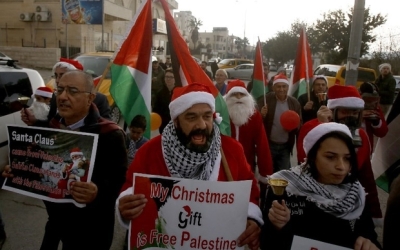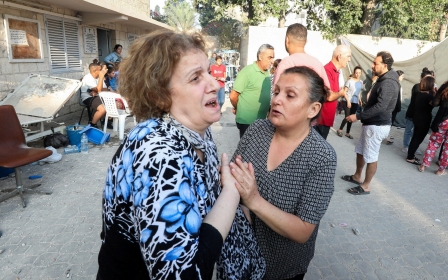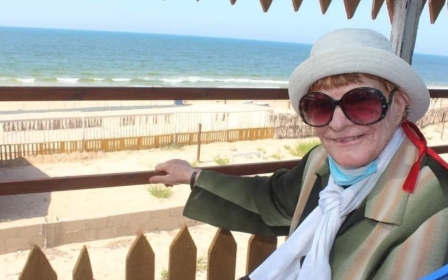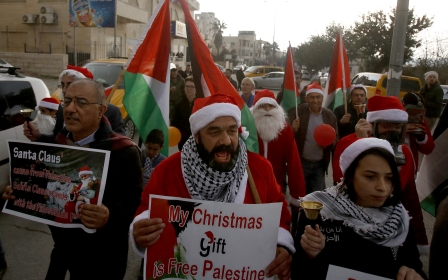Israel-Palestine war: Palestinians cancel Christmas celebrations amid Gaza devastation
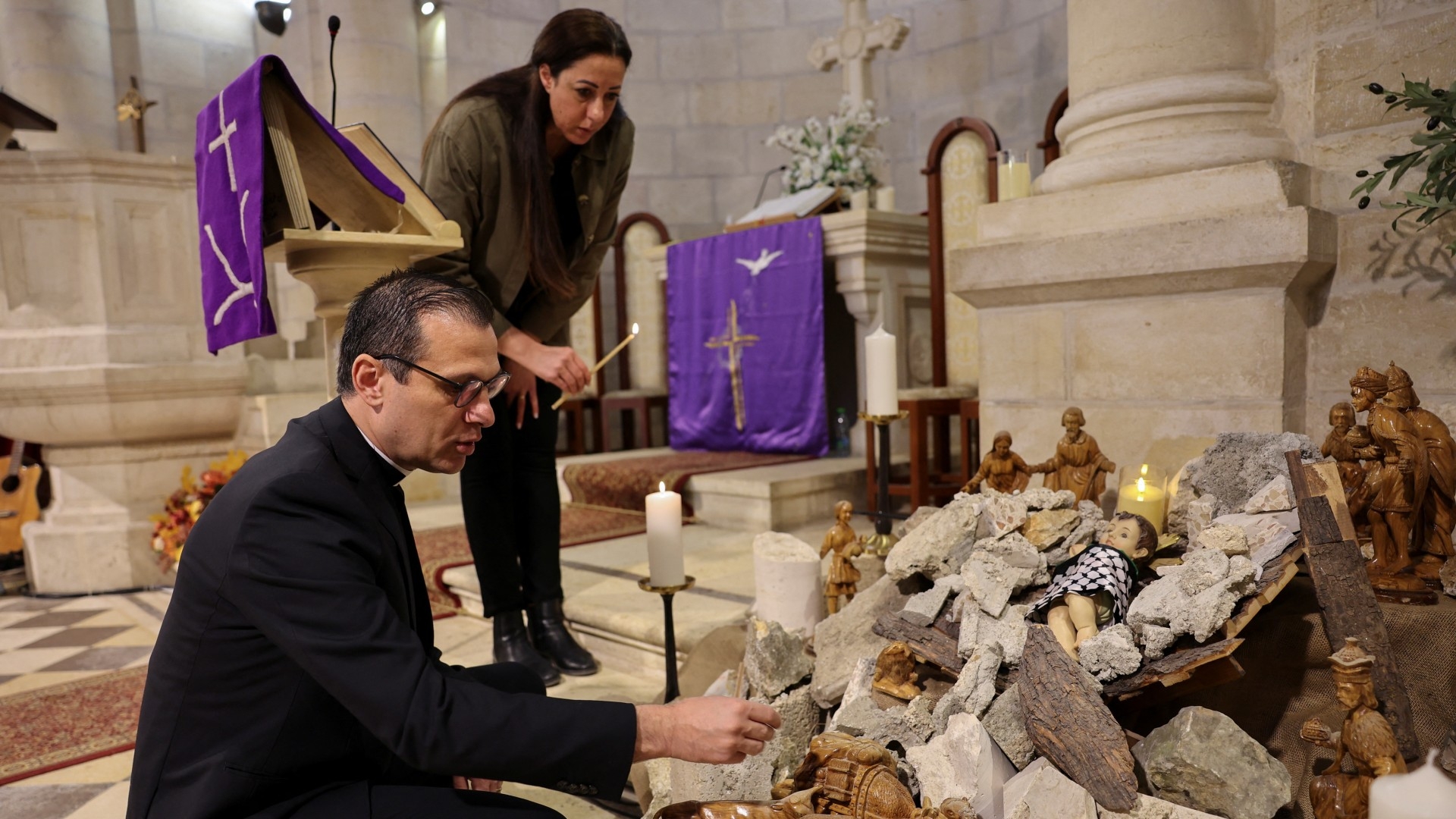
In Gaza, the occupied West Bank and Israel, the typically festive season is instead sombre.
This year, there will be no Christmas lights in Bethlehem, no festive parades in Jerusalem or elaborate decorations in Israel.
In Gaza, Palestinians are mourning the loss of over 17,000 killed in Israeli bombings. Bodies are being pulled out from under the rubble, while people continue to search for their missing loved ones amidst wide-scale destruction.
The war, which started on 7 October, has come at a time when Christians would usually be preparing for the festive season.
However, for the first time since the start of modern celebrations of Christmas, Jesus's birthplace and the Manger Square tree in Bethlehem will not be decorated.
New MEE newsletter: Jerusalem Dispatch
Sign up to get the latest insights and analysis on Israel-Palestine, alongside Turkey Unpacked and other MEE newsletters
Christian leaders and municipal authorities have decided to cancel all public festivities, stating it was "not appropriate".
The patriarchs and heads of the churches in Jerusalem have asked Christians to refrain from "unnecessarily festive" Christmas activities. Catholic churches in Galilee have made a similar request.
The president of the Council of Local Evangelical Churches in the Holy Land, Munir Kakish, said the decision came due to "the thousands killed - and in prayer for peace". He added that "we will only hold traditional services and devotionals on the meaning of Christmas".
'No celebrations during genocide'
Palestinian Christians living in the diaspora have also been affected by the ongoing aggression on Gaza and are choosing to mark Christmas in a more subdued fashion as they mourn.
Ryan al-Natour, a Palestinian Christian from Australia, said he felt it was necessary to cancel celebrations around occupied Palestine.
"I feel this is necessary as it would be abhorrent to celebrate in the midst of a genocide," he told Middle East Eye.
'I cannot, in good conscience celebrate this eid whilst Palestinians, both Christians and Muslims, are being annihilated in large numbers'
- Ryan al-Natour, Palestinian Christian
"Every time I think of them [Palestinian Christians in Gaza], I feel so horribly guilty as a diaspora Palestinian.
"I know they are being starved and bombed relentlessly. I doubt that the celebration of our Lord and saviour is their priority when they are being tortured right now at the hands of a racist, apartheid colonial state that is dedicated to their erasure," he added.
Natour said that the Christian community in Gaza are trying to do what's best for them, despite wanting to stay in their homes and on their land.
But for him, Christmas will be markedly different this year.
"I cannot, in good conscience celebrate this eid [celebration] whilst Palestinians, both Christians and Muslims, are being annihilated in large numbers," he said.
Global sentiment
Around the world, other Palestinian Christians have shared the same sentiment.
A California-based Palestinian Christian told Middle East Eye: "We aren't putting up lights this year. There is nothing to celebrate."
Susan Muaddi Darraj, a Philadelphia-based Palestinian-American writer, said she was not surprised that Christmas celebrations have been cancelled.
"Our community is in mourning," she told Middle East Eye.
"We are in shock at the atrocities being committed against innocent civilians. Palestinian Christians are part of this community, and refraining from celebration is an important indication of our grief and sign of our respect for the souls that have risen," she said.
She, too, said she will not be putting up any decorations.
"There will not be any kind of holiday when it comes to working for a just resolution for Palestine."
Darraj says that this period has been particularly difficult for Palestinians living in the diaspora.
"We are experiencing a deep, painful wave of survivor's guilt in addition to the knowledge that Palestinian lives are simply not valued by our governments."
Jesus in the rubble
In Bethlehem, a church was decorated with debris in solidarity with those killed in Gaza, instead of a Christmas tree.
"While genocide is being committed against our people in Gaza, we cannot celebrate the birth of Jesus Christ this year in any way. We don't feel like celebrating," Evangelical Lutheran Christmas Church in Bethlehem's pastor Munzir Ishak told Anadolu Agency.
The debris, piled up with a baby Jesus placed in the middle, represents the destruction in Gaza and the more than 7,000 children who have been killed since 7 October. Candles were placed around the mound of debris as well as Christian figurines.
'In our homes we can celebrate, but in our hearts we are suffering'
- Ibrahim Dabbour, Council of Church Leaders in Jordan
"We wanted to tell churches worldwide: 'Unfortunately, Christmas in Palestine is like this.' Whether Christian or Muslim, this is the situation we are going through in Palestine. We are exposed to a genocide war targeting all Palestinians.
"Unfortunately, when we think of the birth of Baby Christ, we think of the babies brutally killed in Gaza," Ishak added.
Jordan, which has one of the largest Palestinian refugee communities, also announced that they will be refraining from the typically joyous celebrations for Christmas.
On 2 November, Jordan's Council of Church Leaders said that Christmas celebrations would be cancelled.
Many of the city squares, shopping centres and trees would normally be decked out with decorations and lights at this time of year. However, this year, there will be no Christmas markets, scout parades or public tree lightings.
Ibrahim Dabbour, the general secretary of the Council of Church Leaders and a Greek Orthodox priest, said that religious services will still go ahead.
"In our homes we can celebrate, but in our hearts we are suffering," he said.
The Jordanian Council of Church Leaders also pledged to put donations raised towards helping people in Gaza.
"The announcement was not even necessary," said Imad Mayyah, president of the Jordanian Evangelical Council. "No Jordanian is celebrating anything."
Middle East Eye delivers independent and unrivalled coverage and analysis of the Middle East, North Africa and beyond. To learn more about republishing this content and the associated fees, please fill out this form. More about MEE can be found here.


